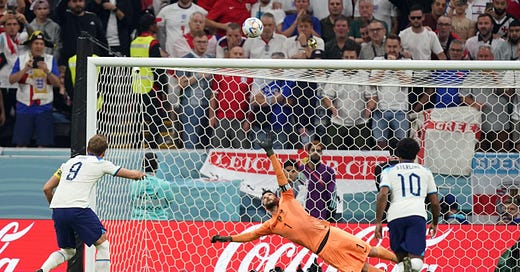In Touch racks up the penalties
InTouch’s AML and RG failures, Indiana’s VLT complication, sports integrity roundup, Ireland assessment +More
Good morning. Welcome to edition #2 of Compliance+More. On today’s agenda:
Skywind-owned In Touch Games hit with third UK Gambling Commission sanction.
VLTs complicate Indiana’s online casino bill.
Bet365’s Raynham Park deal in Massachusetts falls apart.
Swedish operators share intervention data.
Germany’s new regulator wastes no time in getting tough.
Ireland reaches consensus on its Gambling Bill.
If you were forwarded this newsletter and would like to subscribe directly, click here:
In Touch pays the penalty
The Skywind-owned operator of 11 UK-facing iCasino sites racks up nearly £12m in fines.
Touch sensitive: The latest regulatory action against the operator behind iCasino sites including drslot.co.uk, cashmo.co.uk and slotfactory.com has paid a £6.1m penalty after an investigation once again revealed AML and social responsibility failings.
Recall, In Touch was bought by Skywind (which is owned by former Playtech founder Teddy Sagi) in June last year for an undisclosed sum.
Subsequent reports suggested it had let 50 people go at In Touch’s Birmingham, UK base, including many of its customer service team.
Got form: In Touch’s previous sanctions were levied in March 2021 when it paid £3.4m in fines and received an official warning, while in 2019 it paid £2.2m. Kay Roberts, executive director of operations at the UK Gambling Commission, said the level of fine reflected the Commission’s determination to take “escalating enforcement action” where failures are repeated.
She added that considering In Touch’s “history of failings”, the Commission “expected to see significant improvement when we carried out our planned compliance assessment”.
“Disappointingly, although many improvements had been made, there was still more to do,” she added.
The failings: The Commission found that In Touch had failed to interact with a customer until seven weeks after they had been lagged for erratic play patterns and accepting a customer’s word over £6,000 of earnings.
The AML failings included not adequately taking account of the risk of a customer being a beneficiary of a life insurance policy, having “links to high-risk jurisdictions” and issues around politically exposed persons.
White Paper further reading
Worst-case scenario: Experts share their thoughts on what might be coming in the UK government’s White Paper in the Pinchpoint.
** SPONSOR’S MESSAGE ** Department of Trust's mission is to turn affordability, AML, EDD and safer gambling checks from being a challenge which erodes trust, consumes resources and complicates operations into a value-add which enhances your relationship with your customers and supports your business. That's why we're proud to have such strong support from players and operators alike. Visit: www.dotrust.co.uk/
Indiana’s VLT complication
Indiana is seen as the best hope to legalize online casinos in 2023.
Good news/Bad news: Public Policy Committee Chair Rep. Ethan Manning has filed a Bill (HB 1536) that seeks to legalize online casino gambling, online poker and online lottery games.
However, the Bill was not part of a January 24 hearing because the reappearance of VLTs has derailed the process.
Per backchannel chatter, a hearing on HB 1536 will be delayed at least two weeks to give proponents enough time to muster enough affirmative votes.
VLTs giveth and VLTs taketh away: VGTs/VLTs are a controversial subject in the Midwest, where supporters in non-VGT states point to the significant revenue VGTs generate in Illinois. But that revenue comes at the expense of casinos and other gambling venues.
Illinois has 45,000 VGT machines in 8,000 bars, restaurants, gas stations, VFWs and Lodges, liquor stores and nightclubs.
Those machines generated $233m in revenue and nearly $80m in tax revenue in December 2022.
By comparison, Illinois’ 11 casinos tallied $114m in revenue and $39m in tax revenue.
In December 2011 (pre-VGTs), Illinois’ 10 casinos generated $135m in revenue.
The compromise: Indiana casinos will likely need to make some concessions on VLTs for online casinos to become a reality. The casino industry will never agree to Illinois-level VLTs but might agree to a more limited VLT package. A bill (HB 1548) would allow for up to five VLT machines at fraternal organizations, veterans organizations, alcoholic beverage establishments and truck stops.
HB 1548 is still more wide-ranging than casinos would like (between 1,300 and 2,800 establishments and 7,000-14,000 machines). But, if a compromise can be reached, it could be a palatable jumping-off point.
Zooming out: Sports betting has made tremendous inroads in the US since the Supreme Court struck down PASPA in May 2018. For online casinos and poker, the US has been a much tougher road, with six states legalizing online casinos and seven states legalizing online poker.
The spread of legal sports betting is supposed to change this:
Lawmakers are growing more comfortable with and amenable to online gambling.
In their constant search for revenue, states are looking for the next thing.
Mass tidbits
Caesars in, Bet365 out: Caesars has announced a retail betting partnership with Raynham Park pending regulatory approval. The bigger news, though, is the disintegration of a mobile-only deal between Raynham Park and Bet365.
According to Raynham Park owner Chris Carney, Bet365 was put off by some of the onerous regulations in Massachusetts we covered in our Jan. 24 newsletter.
Carney’s comments have not been confirmed by Bet365.
With the Bet365 deal falling apart, neither of the two MA racetracks – Raynham Park and Suffolk Downs – have an official mobile partner.
Bill targets gambling ads: A newly filed Bill (SD 766) would make gambling ads subject to Massachusetts’ strict consumer protection laws on unfair or deceptive advertising. The bill would allow the public to bring claims seeking damages for any deceptive or unfair gambling advertisements.
You just made the list buddy: MA regulators approved a list of wager types and events at a hearing on Tuesday. Contests and awards shows were approved, but judged Olympic events, chess, Jai Alai, Cornhole and esports are prohibited for the time being. The MGC will revisit the prohibited group at a later date.
Swedish data reveal
Three Swedish operators have encouraged other licensees to publish gambling harm data after revealing more than half of customers identified as risky reduced their activity and deposits after being contacted.
First time: The debut set of harmful gambling statistics compiled by ATG, Svenska Spel and Kindred were released on Wednesday, covering the period July 1 to December 31, 2022, with the widest disparities amid the self-exclusion numbers.
Break stuff: Svenska said 1.5% of its (circa 4.3m) customers displayed signs of harm.
More than seven out of every 10 (75.1%) reduced their activity on approach and then on average halved (49.8%) their deposits.
Nearly one in 10 (9.5%) also took a break of under six months, while 3.4% self-excluded for six months or longer.
Work to do: ATG identified problems in 1.4% of its (approx 1.3m) customers.
Just over half (52.4%) then reduced their deposits and, of those, account balances dropped by 64.9%.
ATG said 1.5% took a break of under six months, with 2.2% stopping for over six months.
Copy that: Kindred, whose CEO Henrik Tjärnström wants other operators to follow suit, said 0.5% of its (1.4m) clientele displayed signs of harm.
Following contact, over seven in 10 (76.8%) cut back, with their deposits dropping by more than three-quarters (75.5%) on average.
Self-exclusion for six months or less was 1.4%, with 0.5% out for six months or longer.
Playing for the gallery: The famous Swedish commitment to openness hasn’t pleased everyone. The head of marketing at a Maltese online casino billed the “utter nonsense” numbers “lip service” and “a distraction for the galleries”.
And the general secretary of Norway’s gaming association questioned the independence of the research and said Norsk Tipping and Norsk Rikstoto would not participate.
Germany gets tough
Germany’s new gambling regulator says 60 enforcement cases have been opened against illegal operators, with more in the pipeline.
Auto bans: Glucksspiel (GGL) board member Benjamin Schwanke said targeting the black market is a major priority of the new regulator. Officials were aware of at least 1,000 websites and 100 illegal marketing campaigns directed at German punters. Schwanke said a large number of prosecutions will follow.
Germany’s 16 federal states handed supervision power to the single authority in mid-2021.
The GGL is in the process of approving ‘white list’ licenses.
At present, 38 sports-betting licenses and 22 permits for online gambling have been issued.
Unhappy campers: A split among the states has erupted over the regulating of individual games, however. Federal states decide whether to allow private operators or impose a state monopoly on online casino games.
Officials from Mecklenburg-Vorpommern said they are being forced to apply unworkable rules and will not grant a single license, because it is “not ready to regulate”.
Ireland’s new Bill
Consensus has been achieved with the Gambling Regulation Bill but affordability measures were a notable omission.
GRAI and dry: When enacted, the Gambling Regulation Bill will see the repeal of the three Acts that pass as the current regulatory regime and the establishment of the Gambling Regulatory Authority of Ireland (GRAI). Some of the regulations that GRAI will enforce are also outlined in the Bill as primary legislation and include restrictions on advertising and marketing and measures to militate against gambling harm.
Broadcast advertising will be prohibited from 5.30am to 9.00pm as will marketing aimed at children though any medium. Inducements such as free bets will also be banned.
Additionally, there will be a ban on the use of credit cards and licensees will be prohibited from offering lines of credit.
The GRAI will be the issuing body for all gambling licenses including B2B and will have the ability to levy fines for infractions, with a value of up to 10% of turnover, up to a maximum of €20m.
The regulator will also establish a Social Impact Fund, maintain a self-exclusion register for online gambling and will see the issuance of codes of conduct and a code of practice.
Anne Marie Caulfield has been appointed as CEO and seven potential board members are being sounded out.
Can you afford it? While the contents of the Bill have been broadly welcomed by both the industry and gambling harm charities, the absence of affordability checks has been described as a “big miss” by one gambling harm campaigner. The Department of Justice rejected a call by the Justice Committee to include affordability checks, citing potential data protection issues and the lack of a “culture” of credit rating agencies or companies in Ireland.
The DoJ also rejected a proposal to make licensees liable to the families and creditors for the debts of gamblers who amassed them because of negligence by the operator.
It said it would be “impractical to investigate and enforce” and would lead to the creation of a hierarchy of persons to be refunded.
** SPONSOR’S MESSAGE ** Tried, tested and proven over a decade in the highly-regulated US market, and continuing to expand across Europe, Latin America, Asia and Africa. GeoComply harnesses the power of its market-leading geolocation technology to protect against fraud, including fake account creations, bonus abuse, account takeovers, stolen identities, money laundering, and more. Visit geocomply.com.
Playing dirty
Sports-integrity teams have made a busy start to 2023, sniffing out suspect gambling patterns, players betting on themselves, and match-fixing in snooker, football and tennis.
The dirtiest game: The tennis corruption unit is currently investigating multiple “persons of interest” at this year’s Australian Open, per local media. More on-site surveillance is needed, says the International Tennis Integrity Agency, amid worries the sport has become the number one target for match-fixing gangs.
Four players copped life bans in 2022, while 26 different players, coaches and umpires were suspended for a combined total of 183 years.
Cue the tears: Earlier this month, 10 Chinese professional snooker players were suspended by the game’s governing body following allegations of match-rigging. World number 9 Zhao Xintong and former Masters champion Yan Bingtao are among those facing charges.
The World Professional Billiards and Snooker Association’s integrity unit and Sportradar carried out the investigation.
All 10 were charged with fixing matches, while some are accused of betting on snooker matches and trying to obstruct the investigation.
(Don’t) back yourself: The Netherlands Gambling Authority received 40 reports of suspected match-fixing between the opening of the country’s online gaming market on 1 October 2021 and 18 December 2022.
It found 12 instances of unusual gambling patterns linked to foreign sporting events and 28 reports of individual athletes betting on their own sports.
The latter includes 25 professional football players from the top and second tiers.
What we’re reading
More than lip service: Caroline Ponsetti, senior director at the Herald Group, says industry talk needs to turn to action in the area of responsible gaming.
Getting Calder: Conservative MP Craig Whiitaker makes the case against “un-Conservative” affordability measures.
Calendar
Feb 6-7: World Regulatory briefing at ICE
An +More Media publication.
For sponsorship inquiries email scott@andmore.media.















